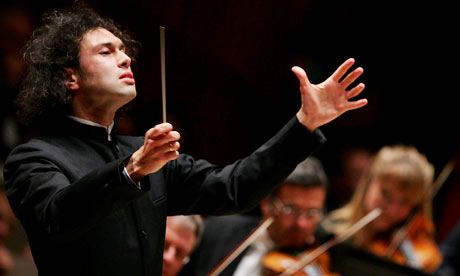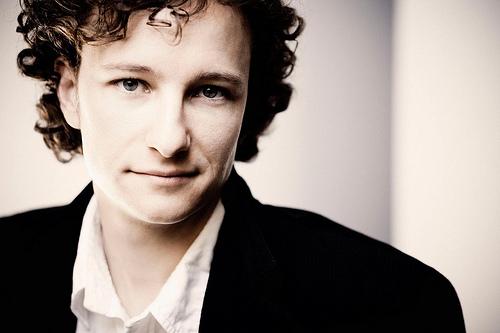Two more contrasting pianists than Yuja Wang and Martin Helmchen would be hard to find. To move within 24 hours from the glittering assault of Wang’s technique to the restrained, almost introverted, Helmchen is an exercise in extremes, and one that left me yearning, Goldilocks-style, for a soloist neither too hot nor too cold, but just right. Dvořák’s Piano Concerto may have been a sober affair, but the London Philharmonic Orchestra and Vladimir Jurowski bid farewell to their Southbank season in a blaze of Central European passion and music by Suk and Janáček.
Anyone heading to Glyndebourne this summer for the new production of The Cunning Little Vixen got a sneak preview of what’s to come at the Royal Festival Hall last night in the concert’s opener – the suite from the opera. Orchestrated by fellow-Czech Vaclav Talich, the suite’s two movements zip through the highlights of the original score, lingering particularly on the murder of the luckless chickens.
Jurowski’s flexible tempos accommodated every glancing shift of mood
Cheeky and subversive as the Vixen herself, the LPO danced their way fluidly from episode to episode. Only the odd sour moment from the flute (and, rather more deliberately, the gloriously insistent brass idee fixe in the Andante) blotted the landscape. Jurowski’s flexible tempos accommodated every glancing shift of mood, and while later in the Suk the LPO occasionally struggled to keep up, here all was organic and unanimous.
The poor relation to the composer’s concertos for violin and cello, Dvořák’s Piano Concerto has never been fully welcomed into the repertoire. Deemed un-pianistic, it was for many years only performed in a revised edition, until Richter championed a return to the original score. It was this authentic version that we heard last night from Helmchen – a burden of notes he wore lightly.
Little has changed since Helmchen’s 2009 recording of the concerto. While his technical facility is great as ever, this quiet ease still verges at times on blankness. Entering the auditorium, the pianist greeted orchestra, shook hands with then leader, and only then (and briefly) acknowledged the audience – an admirable sequence of musical priorities, but one perhaps not best suited to this awkwardly unshowy concerto.
Although structurally and technically massive, the work’s meat is all in the orchestra. Again and again the piano plays the still small voice, offering up themes in their purest form and leaving it to the ensemble to transform these harmonically and texturally into altogether more grandiose or provocative affairs. Only the short cadenza of the Allegro Agitato saw Helmchen step forward, seizing on the miniature sequence of variations with authority. Jurowski (pictured overleaf) and the LPO are a mighty machine these days, and not one lacking in heft. Helmchen’s thoughtful style, elegant but rarely urgent, too often risked being crushed underfoot – the fault not so much of either party, but an incompatibility that might easily be resolved with different repertoire.
 Any memories of restraint and understatement were banished after the interval, in a full-blooded performance of Josef Suk’s symphonic poem Zrani (Ripening). According to the composer the work contains “all the degrees of human emotion” – quite the claim, but scarcely an exaggeration. Scored thickly (not to say impenetrably, at times) with two harps, piano, an additional chorus of trumpets and an offstage choir of female voices joining an already sizeable ensemble, its sequence of attacca movements take us from happiness through the struggle and conflict of bereavement before offering up a pretty affirmative vision of redemption in the afterlife courtesy of the trumpets and heavenly chorus.
Any memories of restraint and understatement were banished after the interval, in a full-blooded performance of Josef Suk’s symphonic poem Zrani (Ripening). According to the composer the work contains “all the degrees of human emotion” – quite the claim, but scarcely an exaggeration. Scored thickly (not to say impenetrably, at times) with two harps, piano, an additional chorus of trumpets and an offstage choir of female voices joining an already sizeable ensemble, its sequence of attacca movements take us from happiness through the struggle and conflict of bereavement before offering up a pretty affirmative vision of redemption in the afterlife courtesy of the trumpets and heavenly chorus.
Harmonically the result is almost proto-Scriabin, flinging colours and harmonies (including a recurring tritone theme) around with abandon. If the LPO struggled slightly to offer the intimacy Helchen wanted from the Dvořák, they came into their own here in the warmth and weight of Suk’s string writing, and the sheer variety of characters he demands from the brass. Jurowski’s precision, paradoxically, made for a wonderfully free-form progress through this incoherent structure, each transition – and there are many – shifting perceptibly and with intent.
It wasn’t the most obvious of celebratory season finales (and I do wonder what the young audience members there on the LPO’s free ticket scheme made of it all), but it was an evening whose slightly offbeat repertoire and textural drama were typical of Jurowksi and his ever-more confident orchestra.














Add comment